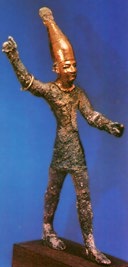Baal
Bible History
Baal was associated with agriculture. He was believed to be the "giver of life" and mankind was dependant upon him for providing what was necessary to sustain the farms, flocks and herds. He was also called the "son of Dagon" (who was in control of the grain), and "Hadad" the storm god who would provide plentiful rains after hearing his voice (thunder).[2]
In the Bible, Baal is also called Beelzebub, or Baalzebub, one of the fallen angels of Satan.[3]
Encyclopedia Mythica[4]
Origin
The worship of the god Baal extends back to the ancient Sumerian people.
The Word Baal:
- means "master" or "owner"
- the name denoted sun, lord or god
Baal's Myth - found on the Ras Shamra tablets, relates to the alteration of the seasons
After defeating the sea god Yam, and building a house on Mount Saphon, and taking possession of numerous cities, Baal announced that he would no longer acknowledge the authority of Mot, "death." Baal not only excluded Mot from his hospitality and friendship, but also told him that he could only visit the deserts of the earth. In response to this challenge, Mot invited Baal to his abode to taste his fare, mud. Being terrified and unable to avoid the dreadful summons to the land of the dead, Baal coupled with a calf in order to strengthen himself for the ordeal, and then set out. El and the other gods donned funeral garments, poured ashes on their heads, and mutilated their limbs, while Anat, aided by the sun goddess Shapash, brought the corpse back for burial. El placed Athtar, the irrigation god, on the vacant throne of Baal, but Anat bitterly missed her dead husband. She begged Mot to restore Baal to life, but her pleas went without avail, and Anat's attempts to interest the other gods in helping her were met with cautious indifference. Thus, Anat assaulted Mot, ripping him to pieces "with a sharp knife," scattering his members "with a winnowing fan," burning him "in a fire," grinding him "in a mill," and "over the fields strewing his remains." El, in the meantime, had a dream in which fertility returned, which suggested that Baal was not dead. Afterwards, he instructed Shapash to keep watch for him during her daily travels. In the due course of time Baal was restored, and Athtar fled from his throne. Yet Mot was able to arrange another attack, but on this occasion all of the gods supported Baal, and neither combatant could gain the victory. Finally El intervened and dismissed Mot, leaving Baal in possession of the field.
"Collapse"
Baal, the sun god, was fervently prayed to for the protection of livestock and crops. Priests instructed the people that Baal was responsible for droughts, plagues, and other calamities. People were often worked up into great frenzies at the prospects of displeasing Baal. In times of great turbulence human sacrifices, particularly children, were made to the great god Moloch.
Citations
- ↑ http://www.bible-history.com/resource/ff_baal.htm
- ↑ http://www.bible-history.com/resource/ff_baal.htm
- ↑ http://www.pantheon.org/articles/b/baal.html
- ↑ http://www.pantheon.org/articles/b/baal.html
Josie Russ
